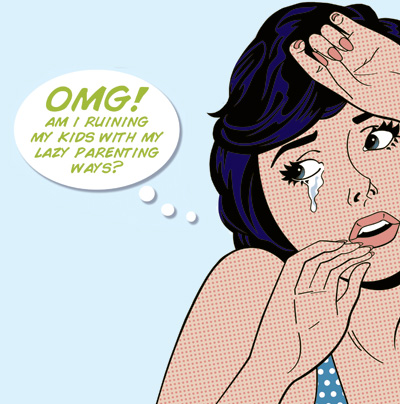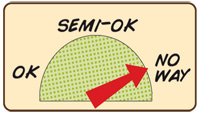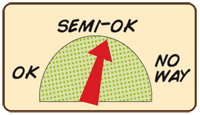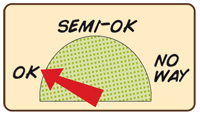 You know who you are.
You know who you are.
Yes, you, in the stretched-out yoga pants, juggling your latte and iPhone as you load your toddler into your DVD-equipped car. You whip the wrap off a Lunchables and hand it back to the kid, then crank up The Backyardigans for a little slack-jawed commute to the gym day care.
Supermom? As if. You landed that helicopter years ago. You are so over sweating the small stuff; the kids will be fine! Or will they?
Good news, slacker parent! The experts are on your side (for the most part). Turns out, “helicopter parenting” can have unintended — even harmful — results. Instead of growing into the hypereducated, self-actualized person you envision, your kid may become an über-precious and entitled member of the so-called “T-ball generation,” in which every swing gets a standing ovation.
The antidote? Slacker parenting! We’re here to help. We asked top local experts to weigh in on your top 10 “bad habits.” Some are OK, some are no way! Read on — and then get slackin’!
Is Froot a food group?
Hey — it says “fortified” right on the label, so how bad can it be? You have a sneaking suspicion that you should be paying closer attention to your kids’ nutrition. Maybe you give them a daily multivitamin to take up some of the slack. Is that good enough?
Not according to Dr. Janice Woolley, a retired Mercer Island pediatrician and the co-author (with writer Jennifer Pugmire) of Food for Tots. “There’s a lot more to food than vitamins,” Woolley says. “We need the fiber, the phytochemicals that we are just beginning to understand, and of course, it’s ideal for a child to learn to enjoy a variety of healthy foods.”
If you’re not dishin’ up the leafy greens, you’re not creating healthy eating habits, Woolley says. “It’s likely that the child’s growth won’t be stunted, but there are bigger long-term problems, like obesity, cardiovascular disease, cancer, diabetes and other chronic illnesses, that can be the result of lifelong eating patterns.”
But the news is not all bad. “Will an occasional Happy Meal be a huge problem? Of course not,” Woolley says. “But good nutrition — including eating plenty of vegetables — is an important goal to work towards.” Woolley says veggies often go down best when served raw with dips. As for Froot by the Foot? “Nothing trumps fresh fruit,” she says.
Baby Zombies
“It’s educational!” you tell yourself, as you plop your tot in front of the tube. Hey, it’s the only way you’ll ever see the inside of your shower! Are you melting baby’s brain?
“I think the majority of parents feel guilty about their child’s use of media,” says Dr. Dimitri Christakis, “and I don’t think that’s very constructive. It leads to them not taking appropriate actions to use media wisely.”
Christakis would know. He’s the director of the Center for Child Health, Behavior and Development at Seattle Children’s Research Institute and the author of The Elephant in Your Living Room: Making Television Work for Your Kids. Christakis has studied a lot of slacker media moves. His bottom line? “Don’t focus on quantity — which is what most parents worry about — focus on what they’re actually watching. The truth is there are a lot of programs for young kids that are actually good for kids.”
But, go easy there, slacker. Christakis says the typical Northwest toddler watches two to three hours of TV a day (and if they’re in home-based day care, add another two to three hours) — and that’s just too much. Christakis’ advice to parents: “Keep it short and keep it good.”
My little Vidiot
Your 10-year-old locks on right after finishing his homework. You figure those video games are better than TV, because at least they’re interactive. Are you fooling yourself?
“It’s complicated,” says Christakis. “It comes back to content. Violent video games are very bad for children. And I have real concerns about some Internet games which put kids at risk for Internet addiction.” Once again, the message is moderation. “Be mindful of what is being displaced by video games,” says Christakis. “What else might your child do?”
Dinner and a show
Bonus points for this superslacker move: Feeding the kids dinner — in front of the TV! Maybe you have work to do. Maybe you’re just exhausted. Is eating with iCarly all that bad?
“It’s a terrible habit!” says Dr. Wendy Sue Swanson, pediatrician and the author of the popular Seattle Children’s blog Seattle Mama Doc. “Some of us grew up doing it. It’s called ‘distracted eating.’ Rather than listening to your body and how the food is making you feel, you overeat.” Besides contributing to the obesity epidemic, Swanson says, having the TV on during dinner obliterates the benefits of family meals, such as better family bonding and success in school, and reduced delinquency and incarceration rates. And Swanson points out that many commercials that air during the dinner hour are for foods that are terribly unhealthy.
“Look, we all do this crud to get through our lives,” Swanson says, “but in reality, why is the TV on? Is anyone watching anything that’s necessary?”
Sleepless in Seattle
It stays light until 10 p.m., and besides, the kids are not UN hostage negotiators! How well rested do you need to be to play clappy-clappy and make mud pies? You let bedtime slide — especially in summer. Are your kids at risk of chronic sleep deprivation?
“A late bed time here and there, you can’t beat yourself up about it,” says Swanson. “But what you have to think about is this: If you’re doing it all the time, you may be phase-shifting your kids.” Phase-shifting is the process of actually readjusting your child’s natural melatonin spike, which usually hits around 8 p.m. Mess with beddy-bye too much and you could reset that spike to 10 p.m., and that, Swanson says, can lead to sleep deprivation.
And that can lead to irritability, inattention, poor school performance, and plenty o’ tension in the house. “You’re maybe setting them up for picking a fight,  screaming at you — you may pay for it in another way,” Swanson says. General rule: Toddlers need between 12 and 14 hours of sleep. School-age kids: nine to 10 hours (yes, really!). And from about age 13, kids had better be getting between eight and nine hours of sleep.
screaming at you — you may pay for it in another way,” Swanson says. General rule: Toddlers need between 12 and 14 hours of sleep. School-age kids: nine to 10 hours (yes, really!). And from about age 13, kids had better be getting between eight and nine hours of sleep.
Kindermusik yourself!
Forget Mandarin lessons and music enrichment! You don’t sign your kids up for anything — school and real life are plenty. Are you setting your child up for failure?
“One problem with not signing our kids up for anything is that it really feels like neglect,” says Dr. Wendy Mogel, author of the New York Times bestseller The Blessing of a Skinned Knee: Using Jewish Teachings to Raise Self-Reliant Children. “Since everyone else has swallowed the Kool-Aid, it feels as though you are depriving your child of essential social, academic and cultural opportunities, and that they will slide right off the track that would lead them to future success.”
Gulp.
OK, but really, Dr. Mogel says she doesn’t like to see a child with no extracurricular enrichment whatsoever. The problem, she says, comes with overkill. “All of this adult-supervised activity, where you can do things right or wrong, is kind of creepy,” Mogel says. “I want kids to have time where they can make up the rules of their own games, use their imagination, get dirty, get skinned knees.”
But Mogel warns parents not to slip into the trap of too much downtime: “Kids will say, ‘I’m fine! I’m happy not to have all of these enrichment activities! I’ll just sit with Nintendo all day.’”
The "Room Mom" dash
You know the one, where you bolt for the door when you see that clipboard being passed around? Heck, you’re not signing up for anything! You’ve got a life! Maybe a job or two! When it comes to field trips and class parties, you’re strictly a no-show. Are you disappointing your kids by not stepping up?
“What the schools say to me a lot of the time is ‘Oh, my gosh! How can we get these parents out of the classroom?’” says Mogel. “School is a little haven of privacy for kids, away from parents’ prying eyes.”
Still, your total slacker avoidance of all things glue-sticky might be a little extreme. “Kids have a good feeling when their parents are part of the school community,” she says. “Moderation is what’s appropriate.
“Just being present to listen to them talk about what interests them without asking a million intrusive, nervous questions is just as good as being room parents,” Mogel says, and thousands of slacker parents everywhere stand up and applaud.
Plug ugly
He’s 4 years old and still using a pacifier. Are you stunting his speech development?
“Most specialists and studies find that pacifier use doesn’t cause speech delays,” says pediatrician Swanson, “but it really makes me wonder if it causes them to talk less. If that kid’s got a wad of silicone in his mouth, he’s not going to communicate in the same way.”
 Swanson recommends getting rid of the pacifier at around 6 months of age, before it becomes a serious habit. “Most people — including myself — blow right past that deadline,” she says.
Swanson recommends getting rid of the pacifier at around 6 months of age, before it becomes a serious habit. “Most people — including myself — blow right past that deadline,” she says.
“My next deadline comes at age 2,” because after age 2, pacifier use often causes malocclusion of the front teeth (i.e., “buck” teeth). And besides, “You’re just showing them that non-nutritive sucking is normal and acceptable,” Swanson says. And that undermines a very important safety lesson: Don’t put things in your mouth that are not food.
Ten-second rule
Your baby’s pacifier just fell on the kitchen floor. You pick it up and pop it back in. Are you introducing deadly microbes into your baby’s fragile system?
Rejoice, oh slacker parent: The 10-second rule is real! That’s according to my new best friend, Erika Schreder, staff scientist for Washington Toxics Coalition. “I have looked at studies that basically confirm that the 10-second rule isn’t altogether off,” Schreder says, then goes on to kill the buzz: “This is assuming that you do clean your floors at least once a week.”
Errr . . . what?
“You do have to vacuum at least once a week,” insists Schreder, and you also have to mop the kitchen floor. “Toxic chemicals build up in house dust — everything from lead to phthalates to toxic flame retardants — so we recommend you damp dust and vacuum at least once a week.”
Schreder does offer a glimmer of hope for us no-scrub slackers, though. “Skip the obsessive cleaning! You’re actually doing your kid a favor by not bleaching your countertops.” According to Schreder, those harsh, expensive chemicals are unnecessary. “Soap and water is fine for cleanup of practically anything in your home.”
Booster madness
For years, you’ve meticulously strapped, unstrapped, restrapped, tightened, heightened, rotated and relocated that child’s car seat. You even have a special designated rearview mirror just so you can keep one eye on Precious and one on the road. Now that your child is 7, you don’t always bother. Should you?
“When you look at how kids die, this is a big one,” says Swanson. “The odds of injury are 59 percent less in a booster than just a seatbelt. It’s super clear.”
Booster seats reduce injury in car crashes because of the way they distribute the crash forces, says Swanson. They place the seatbelt over strong bones, rather than soft tissue. Without a booster, “You can get these horrific exo-spinal injuries,” Swanson says. “Your child’s body is going 60 miles an hour. Without a booster, they can just be ejected.”
When your child is 40 pounds, he can make the transition to a booster seat. But he can’t transition out of that booster seat until he is eight years old . . . or 4-foot-9! “Which could mean you have near-teenagers who you know will be safer in a booster,” says Swanson. That can be a tough sell, but it needs to be a hard and fast rule, she says. “There should be no bending. You are trying to protect your child in the best way you can. It’s not anything to negotiate.”
Kristen Russell Dobson is ParentMap’s managing editor. Her fave parental slacker moves include Eat Dessert First Night, “hemming” pants with safety pins and “educational” Mythbusters marathons. She is a fully recovered room mom.
Resources for slacker parents
Great slacker parent info:
Food for Tots by Dr. Janice Woolley and Jennifer Pugmire
The Elephant in Your Living Room: Making Television Work for Your Kids by Dr. Dmitri Christakis
The Blessing of a Skinned Knee: Using Jewish Teachings to Raise Self-Reliant Children by Dr. Wendy Mogel
Great slacker parent reads:
Just Let Me Lie Down: Necessary Terms for the Half-Insane Working Mom by Kristin Van Ogtrop
Confessions of a Slacker Mom by Muffy Mead-Ferro
The Perfect Baby Handbook: A Guide for Excessively Motivated Parents by Dale Hrabi
Naptime Is the New Happy Hour by Stefanie Wilder-Taylor
The Three-Martini Play Date: A Practical Guide to Happy Parenting by Christie Mellor
Eats, Poops & Leaves: The Essential Apologies, Rationalizations, and Downright Denials
Every New Parent Needs to Know and Other Fundamentals of Baby Etiquette by Adam Wasson
Websites for slacker parents:
Washington state seat belt laws
Lots of info on safe cleaning products
Seattle Mama Doc
Great slacker mom blogs: Mommytracked and Dooce









